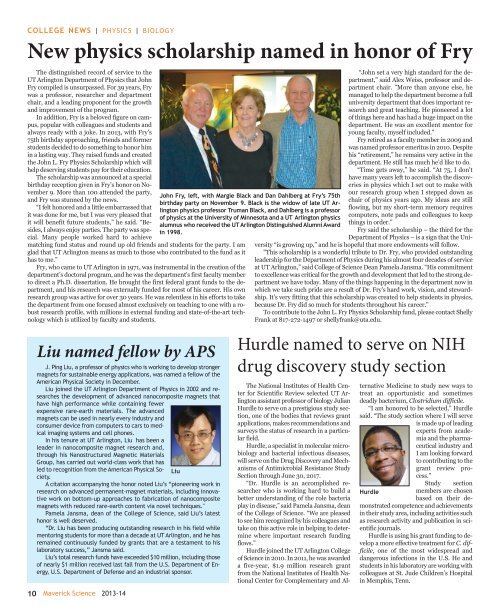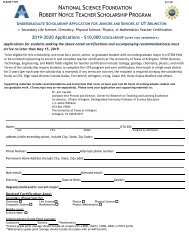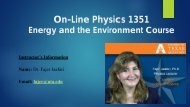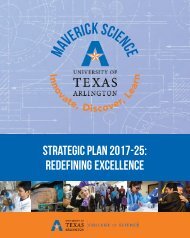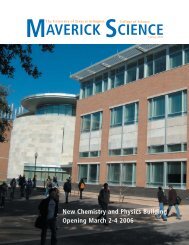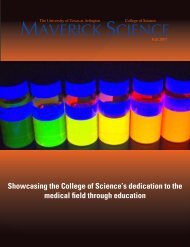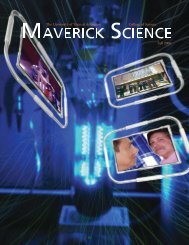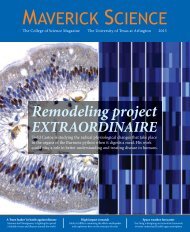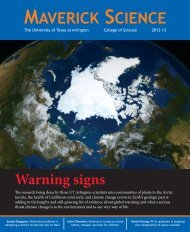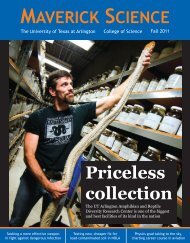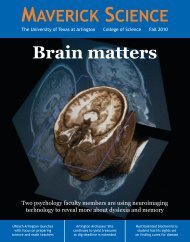Maverick Science mag 2013-14
Create successful ePaper yourself
Turn your PDF publications into a flip-book with our unique Google optimized e-Paper software.
COLLEGE NEWS | PHYSICS | BIOLOGY<br />
New physics scholarship named in honor of Fry<br />
The distinguished record of service to the<br />
UT Arlington Department of Physics that John<br />
Fry compiled is unsurpassed. For 39 years, Fry<br />
was a professor, researcher and department<br />
chair, and a leading proponent for the growth<br />
and improvement of the program.<br />
In addition, Fry is a beloved figure on campus,<br />
popular with colleagues and students and<br />
always ready with a joke. In <strong>2013</strong>, with Fry’s<br />
75th birthday approaching, friends and former<br />
students decided to do something to honor him<br />
in a lasting way. They raised funds and created<br />
the John L. Fry Physics Scholarship which will<br />
help deserving students pay for their education.<br />
The scholarship was announced at a special<br />
birthday reception given in Fry’s honor on November<br />
9. More than 100 attended the party,<br />
and Fry was stunned by the news.<br />
“I felt honored and a little embarrassed that<br />
it was done for me, but I was very pleased that<br />
it will benefit future students,” he said. “Besides,<br />
I always enjoy parties. The party was special.<br />
Many people worked hard to achieve<br />
matching fund status and round up old friends and students for the party. I am<br />
glad that UT Arlington means as much to those who contributed to the fund as it<br />
has to me.”<br />
Fry, who came to UT Arlington in 1971, was instrumental in the creation of the<br />
department’s doctoral program, and he was the department's first faculty member<br />
to direct a Ph.D. dissertation. He brought the first federal grant funds to the department,<br />
and his research was externally funded for most of his career. His own<br />
research group was active for over 30 years. He was relentless in his efforts to take<br />
the department from one focused almost exclusively on teaching to one with a robust<br />
research profile, with millions in external funding and state-of-the-art technology<br />
which is utilized by faculty and students.<br />
Liu named fellow by APS<br />
J. Ping Liu, a professor of physics who is working to develop stronger<br />
<strong>mag</strong>nets for sustainable energy applications, was named a fellow of the<br />
American Physical Society in December.<br />
Liu joined the UT Arlington Department of Physics in 2002 and researches<br />
the development of advanced nanocomposite <strong>mag</strong>nets that<br />
have high performance while containing fewer<br />
expensive rare-earth materials. The advanced<br />
<strong>mag</strong>nets can be used in nearly every industry and<br />
consumer device from computers to cars to medical<br />
i<strong>mag</strong>ing systems and cell phones.<br />
In his tenure at UT Arlington, Liu has been a<br />
leader in nanocomposite <strong>mag</strong>net research and,<br />
through his Nanostructured Magnetic Materials<br />
Group, has carried out world-class work that has<br />
led to recognition from the American Physical Society.<br />
A citation accompanying the honor noted Liu’s “pioneering work in<br />
research on advanced permanent-<strong>mag</strong>net materials, including innovative<br />
work on bottom-up approaches to fabrication of nanocomposite<br />
<strong>mag</strong>nets with reduced rare-earth content via novel techniques."<br />
Pamela Jansma, dean of the College of <strong>Science</strong>, said Liu’s latest<br />
honor is well deserved.<br />
“Dr. Liu has been producing outstanding research in his field while<br />
mentoring students for more than a decade at UT Arlington, and he has<br />
remained continuously funded by grants that are a testament to his<br />
laboratory success,” Jansma said.<br />
Liu’s total research funds have exceeded $10 million, including those<br />
of nearly $1 million received last fall from the U.S. Department of Energy,<br />
U.S. Department of Defense and an industrial sponsor.<br />
10 <strong>Maverick</strong> <strong>Science</strong> <strong>2013</strong>-<strong>14</strong><br />
John Fry, left, with Margie Black and Dan Dahlberg at Fry’s 75th<br />
birthday party on November 9. Black is the widow of late UT Arlington<br />
physics professor Truman Black, and Dahlberg is a professor<br />
of physics at the University of Minnesota and a UT Arlington physics<br />
alumnus who received the UT Arlington Distinguished Alumni Award<br />
in 1998.<br />
Liu<br />
“John set a very high standard for the department,"<br />
said Alex Weiss, professor and department<br />
chair. "More than anyone else, he<br />
managed to help the department become a full<br />
university department that does important research<br />
and great teaching. He pioneered a lot<br />
of things here and has had a huge impact on the<br />
department. He was an excellent mentor for<br />
young faculty, myself included."<br />
Fry retired as a faculty member in 2009 and<br />
was named professor emeritus in 2010. Despite<br />
his “retirement,” he remains very active in the<br />
department. He still has much he’d like to do.<br />
“Time gets away,” he said. “At 75, I don't<br />
have many years left to accomplish the discoveries<br />
in physics which I set out to make with<br />
our research group when I stepped down as<br />
chair of physics years ago. My ideas are still<br />
flowing, but my short-term memory requires<br />
computers, note pads and colleagues to keep<br />
things in order.”<br />
Fry said the scholarship – the third for the<br />
Department of Physics – is a sign that the University<br />
“is growing up,” and he is hopeful that more endowments will follow.<br />
"This scholarship is a wonderful tribute to Dr. Fry, who provided outstanding<br />
leadership for the Department of Physics during his almost four decades of service<br />
at UT Arlington,” said College of <strong>Science</strong> Dean Pamela Jansma. “His commitment<br />
to excellence was critical for the growth and development that led to the strong department<br />
we have today. Many of the things happening in the department now in<br />
which we take such pride are a result of Dr. Fry's hard work, vision, and stewardship.<br />
It’s very fitting that this scholarship was created to help students in physics,<br />
because Dr. Fry did so much for students throughout his career."<br />
To contribute to the John L. Fry Physics Scholarship fund, please contact Shelly<br />
Frank at 817-272-<strong>14</strong>97 or shellyfrank@uta.edu.<br />
Hurdle named to serve on NIH<br />
drug discovery study section<br />
The National Institutes of Health Center<br />
for Scientific Review selected UT Arlington<br />
assistant professor of biology Julian<br />
Hurdle to serve on a prestigious study section,<br />
one of the bodies that reviews grant<br />
applications, makes recommendations and<br />
surveys the status of research in a particular<br />
field.<br />
Hurdle, a specialist in molecular microbiology<br />
and bacterial infectious diseases,<br />
will serve on the Drug Discovery and Mechanisms<br />
of Antimicrobial Resistance Study<br />
Section through June 30, 2017.<br />
“Dr. Hurdle is an accomplished researcher<br />
who is working hard to build a<br />
better understanding of the role bacteria<br />
play in disease,” said Pamela Jansma, dean<br />
of the College of <strong>Science</strong>. “We are pleased<br />
to see him recognized by his colleagues and<br />
take on this active role in helping to determine<br />
where important research funding<br />
flows.”<br />
Hurdle joined the UT Arlington College<br />
of <strong>Science</strong> in 2010. In 2011, he was awarded<br />
a five-year, $1.9 million research grant<br />
from the National Institutes of Health National<br />
Center for Complementary and Alternative<br />
Medicine to study new ways to<br />
treat an opportunistic and sometimes<br />
deadly bacterium, Clostridium difficile.<br />
“I am honored to be selected,” Hurdle<br />
said. “The study section where I will serve<br />
is made up of leading<br />
experts from academia<br />
and the pharmaceutical<br />
industry and<br />
I am looking forward<br />
to contributing to the<br />
grant review process.”<br />
Hurdle<br />
Study section<br />
members are chosen<br />
based on their demonstrated<br />
competence and achievements<br />
in their study area, including activities such<br />
as research activity and publication in scientific<br />
journals.<br />
Hurdle is using his grant funding to develop<br />
a more effective treatment for C. difficile,<br />
one of the most widespread and<br />
dangerous infections in the U.S. He and<br />
students in his laboratory are working with<br />
colleagues at St. Jude Children’s Hospital<br />
in Memphis, Tenn.


